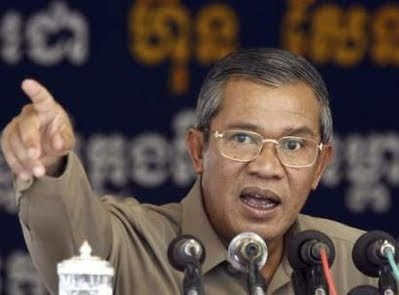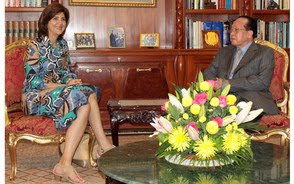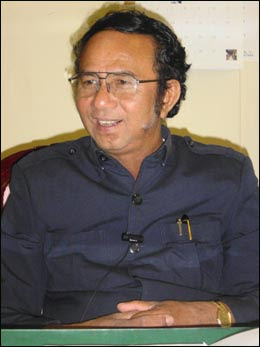Graft Arrests Prompt Questions of ACU Motive [of a power struggle within the ruling CPP]
Sok Khemara, VOA Khmer
Washington, DC
Wednesday, 19 January 2011
Related Links
The police officials, who were arrested for corruption in connection with drug trafficking, were arrested in recent weeks following an investigation by the ACU, which is headed by a senior adviser to Prime Minister Hun Sen, Om Yentieng.
Kem Sokha, president of the Human Rights Party, a minority opposition, said time will tell.
“If it’s an internal dispute or twisting within the internal party, we could see this as a beginning of a fracture,” he said. On the other hand, if it is the “true will” of the government, it’s a “good matter” for Cambodians, he said.
Those arrested were Moek Dara, former secretary-general of the National Authority for Combating Drugs; Hun Hean, former police chief of Banteay Meanchey province; his deputy, Chheang Son; and Chea Leang, an official in the Ministry of Interior’s anti-drug office.
Moek Dara is a former police chief of Battambang province, a political stronghold of Interior Minister Sar Kheng. Hun Hean was once Sar Kheng’s chief bodyguard.
In a ceremony in Prey Veng province, Sar Kheng denied the arrests had targeted anyone by affiliation.
“I think everyone must follow the law and respect the law in fulfilling their duty,” said Sar Kheng. “If anyone commits wrongdoing, that person must face legal action.”
However, Chan Saveth, chief investigator for the rights group Adhoc, said the arrests did follow officials promoted through a political channel. He cautioned against the ACU “bringing the political process” into investigation of “to show off to the public.”
Hun Sen: Cambodia Not to Follow Tunisia's Path
Xinhua Web Editor: Liu
Cambodian Prime Minister Hun Sen (pictured) saidThursday he will not allow his country to follow any situation as happened in Tunisia.
Delivering speech at inauguration of a hospital in Kompong Cham province, Hun Sen said his country will not follow the same trace of Tunisia.
"I will close the door and hit the dog inside," Hun Sen said, referring to a Cambodian politician who suggested a similar example in Tunisia be practiced in Cambodia.
But, Hun Sen did not name the politician except saying he is staying abroad [Sam Rainsy?].
Hun Sen said he came to power through people's votes and he will only lose his power through the same channel. He became the prime minister in 1985, or 26 years since then.
Former Tunisian President Zine al-Abidine Ben Ali, who had ruled the country for 23 years, was ousted from power last week following mass protests from the people. He fled to Saudi Arabia last Saturday.
Hun Sen is vice president of the ruling Cambodian People's Party which won 90 of the total 123-seat parliament in the last general election held in 2008.
Investigation Opened into ‘Jailed’ Policeman’s Car Crash
Heng Reaksmey, VOA Khmer | Phnom Penh Wednesday, 19 January 2011
The prison department of the Ministry of Interior has opened an investigation into a car accident involving a Ratanakkiri official who was supposed to be in jail last week.
Related Links
- Europe Seeks Help in Banning Illegally Timber
- Major Countries Seek Proper Forest Trade
- Former Forest Hunter Turns Eco-Tour Gui
Yoeung Baloung, the former police chief of Ratanakkiri province, who was supposed to be serving 13 years on charges related to illegal logging, was reportedly in a collision following an evening of carousing in Ratanakkiri province’s O’Chum district on Saturday.
“This week, we will open the investigation,” Heng Hak, director of the prison department, told VOA Khmer.
Heng Hak said he had received information that the director of the Ratanakkiri provincial prison, Ngin Nhel, had allowed Yoeung Baloung to leave the prison for medical purposes.
He declined to speculate as to why Yoeung Baloung was at a celebration or in a car accident, but said his department will begin an inquiry.
Ngin Nhel did not respond to repeated phone calls Wednesday.
Adhoc investigator Pen Bunna said Yoeung Baloung had appeared at a traditional Tampounghill tribe ceremony on the night of Jan. 15, where he drank traditional wine before climbing into a car, alone.
Witnesses told Adhoc he drove erratically a short distance before striking a motorbike with three passengers. Toeung Baloung then drove off and has “disappeared,” Pen Bunna said.
The collision injured all three people, who are recovering in a hospital across the Vietnamese border, according to family members and Adhoc.
Sam Keo, 19, and his brother, Thang Pich, 21, were injured, along with motorcycle taxidriver Chheng Nguon, 40.
Sok Vuthy, the 36-year-old uncle of Sam Keo and Thang Pich, said he wanted Yoeung Baloung held responsible.
“I want Yoeung Baloung to cure the victims until they are healthy,” he said.
Colombia Foreign Minister in Cambodia to strengthen Asian ties
Colombia's Foreign Minister, Maria Angela Holguin, is attending a tourist forum in Cambodia to strengthen ties with Asian nations, reports Spanish news agency EFE.
Holguin is in Cambodia to participate in the Tourism Forum of the Association of Southeast Asian Nations (ASEAN) to "advance the strengthening and diversification of the links between Colombia and the countries of the Asian Pacific."
Colombia plans to open an embassy in Indonesia and a new sales office in Singapore as a part of a strategy to revive its contacts with Asian nations, reported newspaper Dinero.
The forum will take place over the course of the week with more than 1,600 delegates from different countries with the aim of promoting tourism between ASEAN countries and other regions.
Cambodia's mobile phone users top 9.8 mln by end of 2010
"By the end of last year, 9.8 million or 66 percent of the total 14.7 million Cambodian people have been using mobile phones," he told reporters.
The number of mobile phone users in Cambodia has steadily increased from 3.8 million in 2008 to 6.3 million in 2009 and up to 9.8 million by last year.
"It's sharply up in the past few years and the rise is expected to continue in coming years," he said. "This reflects the progress in scope and scale of telecommunication sector in Cambodia." So far the coverage services of mobile phone reached up to 80 percent of the whole country, he added.
Cambodia currently has nine mobile phone operators with Mobitel, owned by a local tycoon Kith Meng of Royal Group, leading the sector and followed by Vietnam's owned Metfone, and the other seven are Hello, Mfone, Star Cell, Beeline, Smart Phone, QB, and Excell.
Due to tough competition in the sector in the last two years, Smart Mobile and Star-Cell in December last year announced their consolidation under Smart Mobile to become one of the market leaders. The official consolidation will be begun from March, 2011.
In 2010, the ministry earned 19.5 million U.S. dollars from postal sector and revenue sharing from the nine mobile phone operators, said So Khun.







